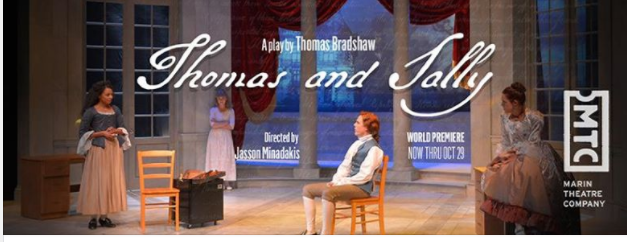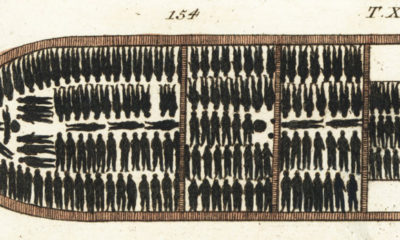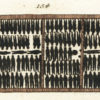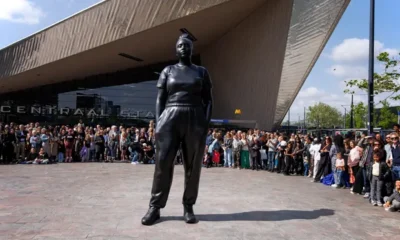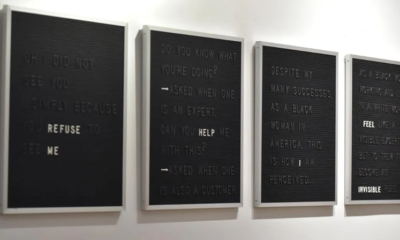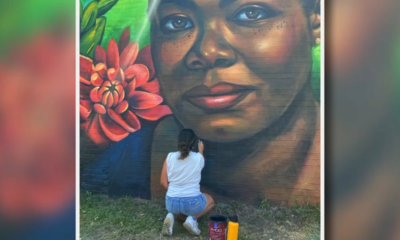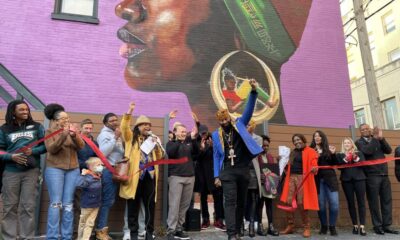Black Women in Arts
Black Women Are Speaking Out Against a Theatre Company’s Thomas Jefferson/Sally Hemings Slavery “Love Story”
Marin Theatre Company is a well-known, well-respected regional theatre about 20 minutes north of San Francisco. I grew up just over the bay from Marin and always loved seeing plays there. The company is known for doing new and exciting work, staying current with theatre trends. They specifically choose works that engage their audiences and spark conversations. But black women theatre artists from the area have pointed out that the company is currently ignoring a conversation they very badly need to be having.
For weeks, protestors have been handing out flyers outside of MTC’s production of Thomas and Sally, a historically fictional imagining of the “relationship” between Thomas Jefferson and his slave, Sally Hemings, who gave birth to six of his children. The flyer (per the San Francisco Chronicle) reads, “Please help us put an end to harmful stereotypes; do not support this play or Marin Theatre Company. Ask for a refund and let Marin Theatre Company know why.”
In an open letter to the company, a group called Black Women’s Voices has laid out exactly why. The group, which describes themselves as “a community of African American/Black diasporic theater artists of varying cultural backgrounds, religions, sexual and gender identities, worldviews and artistic aesthetics” writes, “We are united in our belief that, from its very inception, Marin Theatre Company’s (MTC) current production of Thomas Bradshaw’s Thomas and Sally is an irresponsible, deeply harmful project with no accountability to black women and girls.”
They continue, “As black artists, and as black women, we are all too familiar with our histories and our narratives being imagined through the gaze of white supremacist patriarchy. We take issue with producing organizations whose choices perpetuate the notion that we are a voiceless, powerless group, incapable of understanding how we are being represented. We take issue with the dismissal of our concerns and the erasure of our country’s violent history.”
The play has received mixed reviews, with some raves and manycriticisms. Some critics have insisted that it confronts the ugliness of slavery (if not the actual horrors), and that the framing of the play through the lens of two modern apparently white female college students (one of whom is a descendant of Hemings and Jefferson, both of whom open the play with a conversation about sharing a dildo) is a commentary on American racial identity. Now living halfway across the country, I haven’t seen the play, so I can’t say for sure what my opinion of these elements would be. (Although, having poured over numerous reviews, I feel pretty confident that I would not agree with the above praise.)
Either way, this letter makes it clear that Black women were left out of the conversation, and that’s inexcusable. During auditions and workshops for this world premiere production, their concerns were dismissed. In the company’s mission statement, they write, “We pursue a dialogue with our community that addresses our national and local concerns and interests and assists us in finding a new understanding of our lives.”
Yet, according to Black Women’s Voices, “Over the course of the performances which are still running, MTC has consistently responded to community questions or expressions of pain with either flippant or gas-lighting remarks on social media and worse, with silence.”
“Further, in response to peaceful protest ritual for Sally Hemings by Regina’s Door, a local group mixed with survivors of sex trafficking and…
Please read original article- Black Women Are Speaking Out Against a Theatre Company’s Thomas Jefferson/Sally Hemings Slavery “Love Story”



